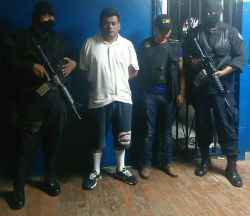Authorities in Guatemala say they have arrested 365 alleged Salvadoran gang members this year, a strikingly high number that may be due to more than just repressive security policies pushing gang members out of El Salvador and into neighboring countries.
According to figures from the criminal investigation unit of Guatemala’s National Civil Police, 36 of the detained gang members are affiliated with the MS13 and 329 are with the Barrio 18, reported El Diario de Hoy.
Juan Carlos Martinez, deputy director of the National Civil Police in El Salvador, reported that only four of the original seventeen MS13 gang leaders targeted under “Operación Jaque” (Operation Check) remain at large. Three have been killed in confrontations with security forces and 10 have been arrested, according to La Prensa Grafica. Operación Jaque was launched by the Salvadoran government in 2015 with the intention of dismantling MS13’s financial apparatus.
Most recently, alleged MS13 leader Juan Francisco Parada Morán, alias “Mongo,” was arrested on October 11 in a shopping center in the department of Jutiapa, according to La Prensa Grafica. As one of the leaders targeted in Operation Jaque, Parada is believed to play a major role in the MS13’s financial structure in El Salvador. He is also alleged to have been involved in at least 66 homicides.
MS13 leader José Alonso Marroquin, alias “Pájaro”, was also arrested on October 12. Parada and Marroquin are believed to be part of the MS13 leadership in central El Salvador, reported La Prensa Grafica.
Salvadoran national Walter Cifuentes Artemio Ortiz, who has been linked to the murder and extortion of sex workers in San Salvador, has also been arrested.
Additionally, La Prensa Grafica reported that an MS13 leader had been captured in Mexico and that the authorities expect him to be deported to El Salvador shortly.
InSight Crime Analysis
Both Salvadoran and Guatemalan officials say this mass migration of gang members is a result of the hardline security policies that El Salvador has enacted in recent months. In April, authorities implemented “extraordinary measures” against the gangs, which they have credited for a precipitous drop in the country’s murder rate. Operation Jaque, meanwhile, appears to have damaged both the leadership and financial structure of the MS13.
But how authorities label gang members may have just as much — or more — to do with the eye-catching number of alleged MS13 and Barrio 18 arrested in Guatemala as the increased security pressure in El Salvador.
SEE ALSO: El Salvador News and Profiles
As InSight Crime has previously noted, the number of estimated gang members in the Northern Triangle (El Salvador, Guatemala, Honduras) varies widely. Police in Honduras, for example, told InSight Crime that there are 25,000 gang members nationwide, but the United Nations Office on Drugs and Crime puts that number at less than half that. Without a standard definition of what constitutes a gang member, police are likely to categorize collaborators and even family members as part of the gang.
To be sure, there are indications that a growing number of Salvadoran gang members are crossing into Guatemala and Honduras — but to what extent remains uncertain.

